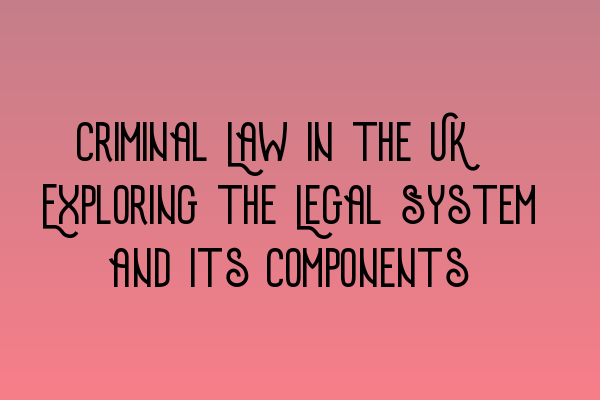Criminal Law in the UK: Exploring the Legal System and Its Components
Criminal law is a fundamental aspect of the UK legal system, designed to maintain order, protect individuals, and ensure justice is served. Understanding the intricacies of criminal law is essential for aspiring solicitors and professionals in the legal field. In this blog post, we will explore the key components of the UK criminal legal system and provide insights to help you succeed in your SQE exam.
1. The Criminal Justice System
The UK criminal justice system is composed of various agencies and institutions that work together to enforce the law, investigate crimes, and adjudicate cases. These include the police, Crown Prosecution Service (CPS), courts, and the prison service. Each entity plays a crucial role in upholding justice and ensuring that offenders face appropriate consequences for their actions.
2. Key Principles of Criminal Law
Understanding the key principles of criminal law is vital for any legal professional. These principles form the foundation of the criminal justice system and guide the interpretation and application of the law. Some of the key principles include:
- Presumption of Innocence: Every person is presumed innocent until proven guilty.
- Burden of Proof: The burden of proving guilt lies with the prosecution.
- Standard of Proof: The standard of proof required in criminal cases is “beyond a reasonable doubt.”
- Mens Rea: The mental element or intent to commit a crime.
- Actus Reus: The physical act or omission that constitutes a crime.
- Strict Liability: Offences that do not require proof of intent.
3. Criminal Offences
There are various categories of criminal offences in the UK, ranging from minor infractions to serious felonies. These offences are classified into different levels of severity and carry corresponding penalties. Some common categories of criminal offences include:
- Summary Offences: Minor offences usually tried in a Magistrates’ Court.
- Indictable Offences: Serious crimes tried in the Crown Court.
- Triable Either Way Offences: Offences that can be tried in either the Magistrates’ Court or Crown Court, depending on their seriousness.
4. Criminal Procedure
The criminal procedure outlines the step-by-step process that takes place from the moment a crime is committed to the conclusion of a court case. Familiarizing yourself with the criminal procedure is crucial for effective legal practice. Key stages in the criminal procedure include:
- Investigation: Gathering evidence to identify and apprehend suspects.
- Charge: Formal accusation of an offence.
- First Court Appearance: Initial hearing where the accused is informed of the charges.
- Trial: A judicial process where evidence is presented and a verdict is reached.
- Sentencing: Determining the appropriate punishment for convicted offenders.
5. Preparing for the SQE Criminal Law & Practice Exam
If you’re pursuing a career as a solicitor, passing the SQE Criminal Law & Practice exam is a crucial step. To succeed in the exam, consider implementing the following strategies:
- SQE Sample Papers: Practice for Exam Success – Familiarize yourself with the exam format and practice solving sample questions to enhance your understanding and improve your performance.
- Focus Areas in SQE1 and SQE2: Mastering Key Concepts – Identify the key areas of criminal law that are heavily assessed in the exam and allocate your study time accordingly.
- Adjusting Your SQE Strategy Based on Mock Performance – Use mock exams as an opportunity to identify your strengths and weaknesses and adjust your study strategy accordingly.
- SQE Mock Debrief Sessions: Critical Steps for Improvement – Participate in mock debrief sessions to gain valuable feedback and learn from experienced professionals.
- Post-Mock Feedback Sessions: Improving Your Performance – Reflect on the feedback received after mock exams and use it to fine-tune your exam preparation.
By following these strategies and utilizing available resources, you can enhance your chances of success in the SQE Criminal Law & Practice exam and pave the way for a rewarding career in criminal law.
Conclusion
Criminal law forms an integral part of the UK legal system, and understanding its principles and components is essential for legal practitioners. By exploring the various aspects of criminal law, familiarizing yourself with the criminal justice system, and adequately preparing for the SQE Criminal Law & Practice exam, you can develop a strong foundation in criminal law and achieve your professional goals. Visit SQE Criminal Law & Practice Law UK to access valuable resources and guidance for your exam preparation.
